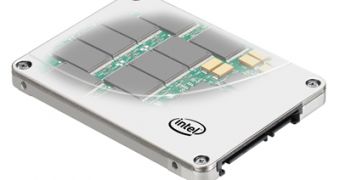Intel's involvement in the field of solid-state drives is quite well-known, and now, the company's decided to take everything to a whole new level by releasing their 3rd generation SSD family, the Intel SSD 320 Series.
According to Intel, the new SSD drives fully leverage the 25-nanometer (nm) NAND flash memory modules and has been designed to replace the previous Intel X25-M SATA SSD family, while in the same time actually being a lot more affordable than the previous models.
It's quite interesting to note that Intel's decided to provide a wide array of storage capabilities for its latest solid state-drives, given the fact that the new SSD 320 Series comes in 40 gigabyte (GB), 80GB, 120GB, 160GB models, as well as two very large-capacity versions, providing 300GB and 600GB of storage space, respectively.
The new drives by Intel come equipped with the 3Gbps SATA II interface (for some strange reason, the company decided not to implement a speedier SATA III interface), but they're still capable of delivering quite an impressive level of performance, namely around 39,500 input/output operations per second (IOPS) random reads and 23,000 IOPS random writes.
And that's not all, since Intel claims that they've managed to actually push sequential write speeds up to 220 megabytes-per-second (MB/s), while sequential read speeds are also quite impressive, at a whopping 270 MB/s, all of which are also made possible by the proprietary firmware and controller.
As far as the pricing of the new Intel SSD 320 Series is concerned, the company revealed the fact that the new series of products is actually roughly 100 US dollars cheaper than their predecessors, selling for around $89 (the 40GB model), $159 – 80GB version, $209 – the 120GB model, $289 – the 160 GB model, as well as $529 and $1,069 for the 300GB and 600GB models, respectively (as a side note, all of the aforementioned prices are in 1,000-unit quantities, which means that pricing per individual unit might actually be quite a bit higher).

 14 DAY TRIAL //
14 DAY TRIAL //